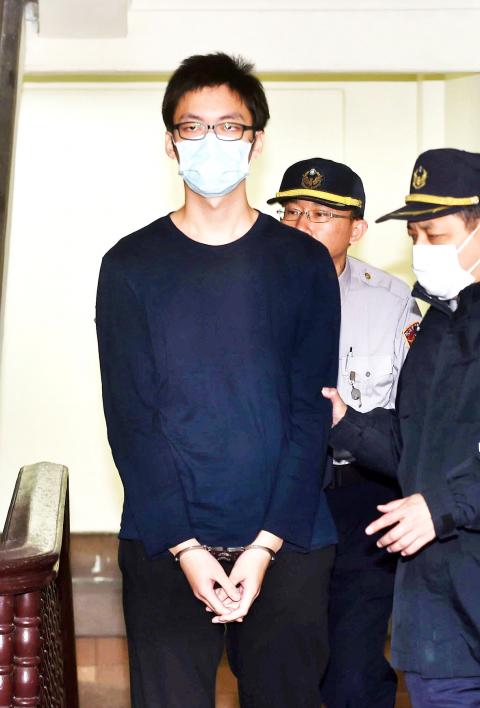The Supreme Court has granted a request by lawyers for convicted Taipei MRT killer Cheng Chieh (鄭捷) to appear in person for the upcoming court hearing to appeal his death sentence.
It is the first time a defendant on death row will appear at the Supreme Court for a trial hearing.
Cheng’s legal team is trying to stave off the death sentence, which was handed down by a lower court in March last year, and upheld by the High Court in October last year.

Photo: Fang Pin-chao, Taipei Times
Cheng, then 21 years old, killed four people and injured 22 in a horrific knife attack on the Taipei MRT on May 21, 2014. He is being held at the Taipei Detention Center in New Taipei City’s Tucheng District (土城).
His lawyers, Lin Chun-hung (林俊宏) and Liang Chia-ying (梁家贏), said that Cheng had agreed to make the request, which they made at the Supreme Court’s pre-trial proceedings earlier this week.
They requested that Cheng defend himself at the trial hearing at the Collegiate Bench (合議庭) of the Supreme Court, which is scheduled for April.
Legal authorities said the victims of the attack and their families can also appear in the hearing, and prosecutors can speak on their behalf.
Cheng’s lawyers said the defense could also challenge the constitutionality of the death sentence.
They will seek an interpretation from the Council of Grand Justices, arguing that capital punishment violates the Constitution, they said.
The legal team said they would ask the Supreme Court to suspend the hearing pending a ruling by the grand justices.
Critics called the moves delaying tactics by the lawyers to buy time for Cheng, because the constitutional challenge could take years.
“It is a waste of legal resources, and a waste of taxpayers’ money,” National Taiwan University law professor Lee Mao-sheng (李茂生) said.
“For Supreme Court cases, it is usually the third ruling, which is to decide whether wrongful judicial procedures or contraventions of law had taken place during the first and second rulings. If there were questions, then the case should be sent back for a retrial. In this instance, the Supreme Court is taking on the wrong task,” Lee said.

SECURITY: As China is ‘reshaping’ Hong Kong’s population, Taiwan must raise the eligibility threshold for applications from Hong Kongers, Chiu Chui-cheng said When Hong Kong and Macau citizens apply for residency in Taiwan, it would be under a new category that includes a “national security observation period,” Mainland Affairs Council (MAC) Minister Chiu Chui-cheng (邱垂正) said yesterday. President William Lai (賴清德) on March 13 announced 17 strategies to counter China’s aggression toward Taiwan, including incorporating national security considerations into the review process for residency applications from Hong Kong and Macau citizens. The situation in Hong Kong is constantly changing, Chiu said to media yesterday on the sidelines of the Taipei Technology Run hosted by the Taipei Neihu Technology Park Development Association. With

A US Marine Corps regiment equipped with Naval Strike Missiles (NSM) is set to participate in the upcoming Balikatan 25 exercise in the Luzon Strait, marking the system’s first-ever deployment in the Philippines. US and Philippine officials have separately confirmed that the Navy Marine Expeditionary Ship Interdiction System (NMESIS) — the mobile launch platform for the Naval Strike Missile — would take part in the joint exercise. The missiles are being deployed to “a strategic first island chain chokepoint” in the waters between Taiwan proper and the Philippines, US-based Naval News reported. “The Luzon Strait and Bashi Channel represent a critical access

CARROT AND STICK: While unrelenting in its military threats, China attracted nearly 40,000 Taiwanese to over 400 business events last year Nearly 40,000 Taiwanese last year joined industry events in China, such as conferences and trade fairs, supported by the Chinese government, a study showed yesterday, as Beijing ramps up a charm offensive toward Taipei alongside military pressure. China has long taken a carrot-and-stick approach to Taiwan, threatening it with the prospect of military action while reaching out to those it believes are amenable to Beijing’s point of view. Taiwanese security officials are wary of what they see as Beijing’s influence campaigns to sway public opinion after Taipei and Beijing gradually resumed travel links halted by the COVID-19 pandemic, but the scale of

Pope Francis is be laid to rest on Saturday after lying in state for three days in St Peter’s Basilica, where the faithful are expected to flock to pay their respects to history’s first Latin American pontiff. The cardinals met yesterday in the Vatican’s synod hall to chart the next steps before a conclave begins to choose Francis’ successor, as condolences poured in from around the world. According to current norms, the conclave must begin between May 5 and 10. The cardinals set the funeral for Saturday at 10am in St Peter’s Square, to be celebrated by the dean of the College